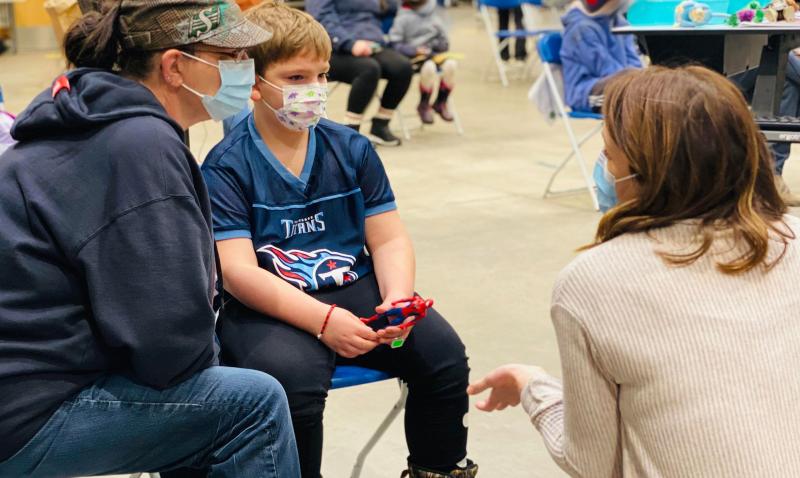Worried about immunizing your child? Create a coping plan
Taking children to get immunized can be a nerve-wracking experience for both children and parents. Having a plan in place before you go can help everyone stay calm and positive throughout the experience, says Dominique Rust, manager of the Child Life Program* for Jim Pattison Children’s Hospital.
“With kids we just have to remember to really slow things down and give them an opportunity to ask questions and become comfortable with the situation,” said Rust.
She asks parents to be up-front with children and tell them what to expect at a vaccination appointment, be it for COVID-19 vaccine or any other childhood vaccine.
“The more opportunity kids have to think through what they’re going to experience, the better they will cope. Giving them choices and opportunities to be part of their treatment plan, procedures and tests will result in a better experience which will help them feel more confident the next time they go for a ‘poke’ or a procedure.”
Remaining positive is essential. “If you are confident and honest with your child, they’ll trust you and that will be their experience. If you are scared and worried, they’re going to feel it’s not a safe situation.”
Rust encourages parents to use neutral language, avoiding apologizing and expressing fear.
When talking about the immunization itself, Rust prefers the word “poke” over “needle” or “shot”, which can be scary terms.
If your child is fearful, “acknowledge it’s okay,” she said. “‘Let’s think about how you’re going to cope through it.’ Sometimes kids will ask, ‘Is it going to hurt?’ Something to say would be, ‘I don’t know how it’s going to feel for you, but we have a coping plan and it might not bother you as much if we go through it together.”
Rust advises parents to talk to their child about what they will see, hear, smell, feel and touch at their appointment, especially if they are attending a mass immunization clinic for their COVID-19 vaccine.
“Walking into a vaccination centre can be an overwhelming experience for a kid. There are long lines, people watching you – it’s unfamiliar. Tell your child, ‘We’re going to get in a line and we’re going to sit in a chair and we’re going to talk to the nurse and this is what will happen next.’ It will help them trust where they’re going, what they’re going to be learning and learn about what their job is. It will help them be part of the experience.”
Rust said some parents may choose to purchase numbing cream, available at many pharmacies, to bring with them to the immunization.
Part of every family’s coping plan should include determining with your child what activity or device will serve as a helpful distraction, she said.
“Ask them, ‘Do you want to sing or do deep breathing? Bring a stuffy or a toy you can squeeze? An iPad so you can watch Paw Patrol? Maybe a Pop It?’ Even bringing a trusted person can help. If your child prefers grandma, then ask her to come. Reassure your child they don’t have to do this alone. ”
Rust encourages parents to give their children something to look forward to once the immunization is complete. “You could tell them, ‘You’re going to have to be really brave and when we’re all done you get a sticker, or a Hot Wheels car, or we’re going for ice cream or we’ll drive around and see all the Christmas decorations.’”
Celebrating a job well done is important, she said.
“Be sure to congratulate them. Give them a high five, tell them they did a great job. You will help frame the memory as a good experience."
Children who are upset need words of encouragement, too.
“Console them, keep the words positive. ‘You did it.’ ‘We’re done.’ And move forward,” she said.
Although immunizations can be stressful events, careful preparation will help both children and parents navigate the experience, she said.
*The Child Life Program is a first for Saskatchewan. The program provides children and families an opportunity to learn about and cope with stressful medical experiences in a hospital setting by providing support through education, preparation, and medical play delivered by child life specialists (therapists). One child life specialist in Regina is funded by the SHA, and Saskatoon-based child life specialists are funded by the Jim Pattison Children’s Hospital Foundation.



